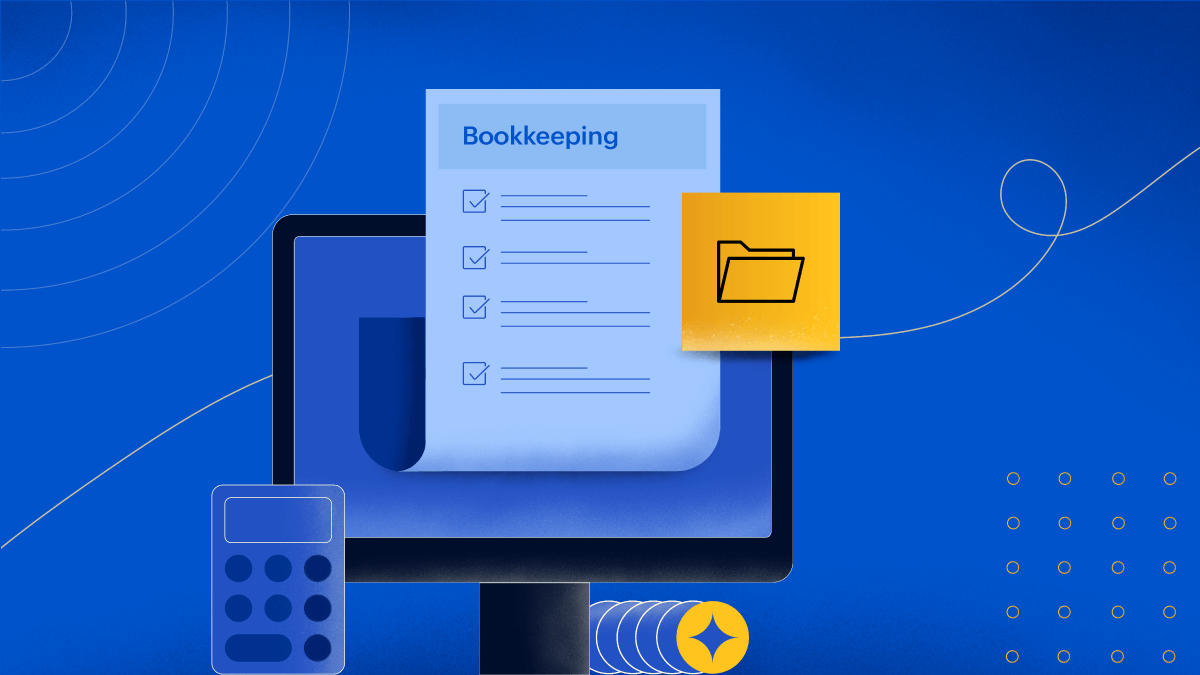- HOME
- Accounting Principles
- Bookkeeping basics: A beginner's guide
Bookkeeping basics: A beginner's guide

Bookkeeping plays a vital role in a company's financial process—whether it's a small business or a well-established one. Without it, a business may lose track of its financial health. While bookkeeping is essential, it does not have to be a headache. By understanding bookkeeping methods, businesses can ensure a smooth and efficient accounting process.
This guide helps you understand what bookkeeping is, why it's important for a business, and the key processes involved.
What is bookkeeping?
Bookkeeping is the daily recording of all financial transactions related to your business. Depending on the needs of the business, the process can range from simple to complex. The idea of bookkeeping is to help businesses stay informed about their financial status.
These records can be maintained either using accounting software or traditional physical books. The professional who records and manages these financial transactions is called a bookkeeper. They typically follow either single-entry or double-entry bookkeeping to ensure transactions are accurately documented.
Why is bookkeeping important?
Bookkeeping helps businesses understand where the money goes, where the revenue comes from, and which tax deductions apply. Here are some key reasons why bookkeeping is important.
Maintain records
Bookkeeping helps prevent the last-minute stress of scrambling to locate missing transactions. Imagine trying to file your taxes or pay a bill only to realize you can't find a crucial record and the deadline is looming. Overwhelming, right? By recording transactions regularly, bookkeeping gives you a clear picture of your finances and helps avoid unnecessary tension and delays.
Know where the money is going
Bookkeeping helps you understand how you spend your money. Are you spending more than you earn? How's your business's profit? Do you have sufficient funds to purchase goods for the next month? All this financial information can be managed effectively if you maintain the books regularly. By recording your income and expenses, you can easily keep track of your company's finances.
Plan your budget
Without organized finances, planning ahead can be a real challenge. Bookkeeping plays a critical role in budgeting for any business. By having your transactions properly recorded and organized, you can easily plan funds for upcoming expenses, which in turn drives business growth.
Be prepared for taxes
Businesses need to know their net profit to pay their taxes, and it is important to have a clear understanding of income and expenses. By keeping an up-to-date record of your finances, you can easily manage your tax payments and filings.
Catch errors
It is better to have your transactions recorded often rather than sitting with the entire financial data six months later. Organizing a large backlog in one sitting can be time-consuming, and trying to piece everything together might leave you confused with mismatches. By having your data regularly recorded, you can avoid last-minute confusion and keep things error-free.
Best practices for maintaining clean and accurate books
As someone new to bookkeeping, you don't have to stress about organizing your transactions. Lised below are a few basic bookkeeping practices you can follow to streamline your transactions.
The first and most important step in bookkeeping is separating your personal and business accounts. Mixing them can lead to unnecessary confusion and stress, which may result in losses.
Track your daily business transactions, including sales, rent, utilities, and more. This helps you understand where the money goes.
It is important to keep your bills organized, as this will help you file your taxes without any delay or penalty.
Reconcile your expenses with bank statements. Ensure each transaction matches your bank records.
It is important to manage your accounts receivable and payable, as this helps maintain cash flow and prevents payment delays.
Make sure to prepare financial statements such as an income statement, balance sheet, and cash flow statement, as these give you a clear picture of your company's financial health.
Once everything is recorded, take time to review and adjust the data. This is an essential step to identify discrepancies and correct errors.
It is important to make bookkeeping a habit. Set aside one day each month for this activity to stay on top of your finances.
Why bookkeeping software is a game-changer for your business
Businesses might have different ways of bookkeeping. Some companies still use journals or physical bookkeeping, and others use spreadsheets like Excel to record their finances. While all these methods can look like feasible options, they involve great manual effort and can become overwhelming.
Zoho Books can be a one-stop solution for all your bookkeeping needs. It offers a faster and simpler solution for cash management, accounts payable and receivable, and other financial requirements. With the help of Zoho Books, you can keep accurate records of your business finances. Additionally, built-in automation takes care of routine tasks, allowing you to focus on growing your business.
Explore how Zoho Books can assist your business by providing accurate bookkeeping records with a free trial.